|
Bricket Wood Historically Bricket Wood was in the parish of St Stephens. |
|
Bricket Wood Historically Bricket Wood was in the parish of St Stephens. |
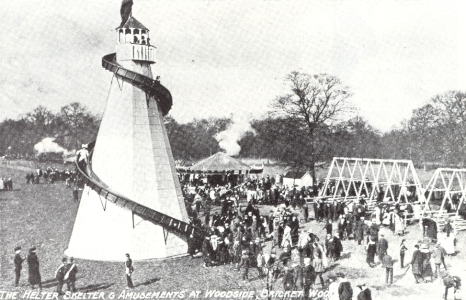
From
A Souvenir of
Bricket Wood
|
The modern community of Bricket Wood owes its origins to the opening of the Watford to St Albans Railway in 1858, the original rural halt being upgraded to a station in 1861. In 1889 Henry Gray realised the potential of running a place where families could enjoy a healthy, peaceful and entirely teetotal day in the country. In effect it became the Victorian equivalent of a theme park - with a large variety of fairground and similar attractions. It became very popular, with special trains being run, and by 1912 over 5000 teas a day were being served. The fair closed during the First World War, and while it reopened in 1919 it finally closed in 1929. The account in A Souvenir of Bricket Wood says:
The present day village started to be developed after the First World War. In 1927 the naturist movement established itself in Bricket Wood and grew until there were five well-appointed camps. Up until the late 1940's there were few public services. Water was obtained from wells - except on the estate built by Mr Christmas which had its own water supply and sewerage scheme. Land was very cheap and large plots were sold to hold week-end chalets. With the building of the Ml (opened 1959) Bricket Wood became suddenly accessible and demand for building land soared. Bricket Wood today - 1982 - is a large village in the Green Belt with a population of around 4,000. It is still part of St. Stephen's Parish (which also contains Park Street and Chiswell Green) and is at the same time a Ward of St. Albans District Council.
|
Bricket Wood Photo by
Downer, of Watford A group of children in the woods, wearing straw hats and apparently picking blackberries.
|
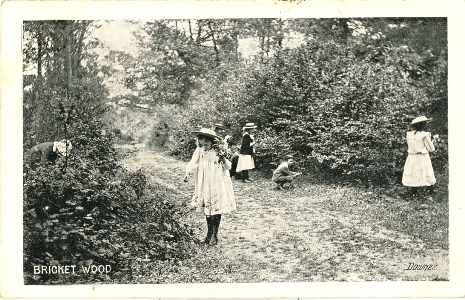 |
There is an excellent history of the modern village, and the earlier farm houses, etc., in A Souvenir of Bricket Wood and the entry in The Hertfordshire Village Book also provides a good introduction.
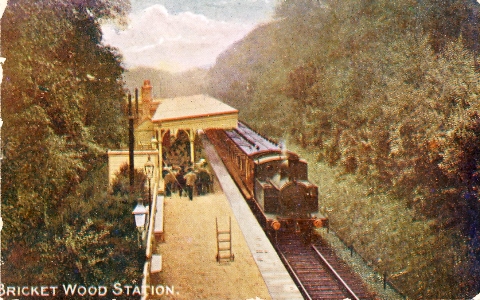 |
Bricket Wood Station Posted 1912 from Park Street by someone who had visited Bricket Wood for the day.
|
There is an active Bricket Wood Society
See also St Stephen's Brickworks
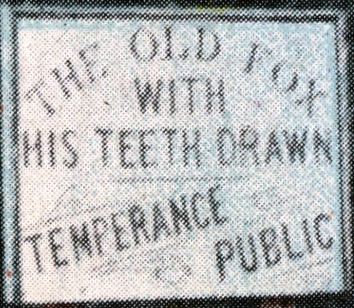 The Old Fox with His Teeth Drawn. |
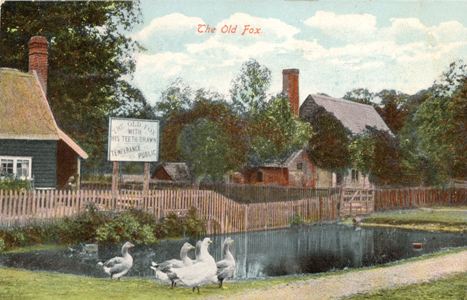 |
|
|
In about 1900 The Old Fox public house lost its licence and became known as The Old Fox with with His Teeth Drawn. It served teas until about 1930. With all the people coming on day trips to Bricket Wood there could have been a significant demand for non-alcoholic refreshments. |
||
|
The Old Fox with His Teeth Drawn. |
|
Alexandra Hall |
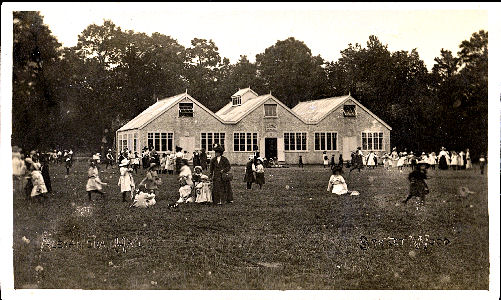 |
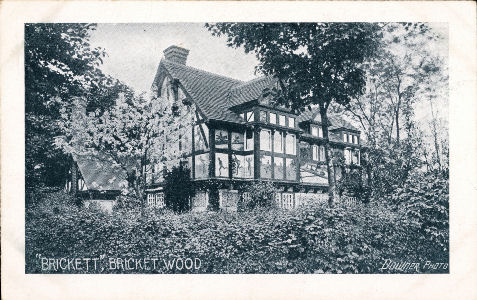 |
|
There is a web site for Spielplatz Naturist Resort which includes a brief history.
Spielplatz is described in the book "No Shadows Fall - Born into Naturism: The Story of Spielplatz" by Iseult Richardson (elder daughter of the founders), published by Coast & Country Publications in December 1994 (192 pages including 50 black and white photos).
|
Munden is a large house in the modern parish of Leavesdon, on the bank of the River Colne near Bricket wood. |
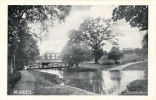 |
If you know of other books, websites, etc, relating to this place, please tell me.
| July 2008 | Page created | |
| October 2009 | details of book on Spielplatz added | |
| February 2014 | Picture of Pleasure Grounds added |